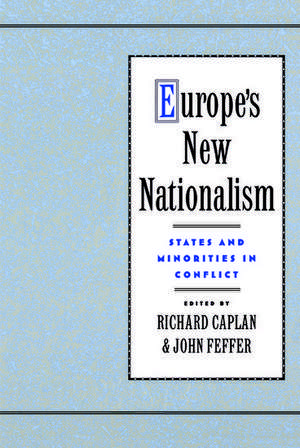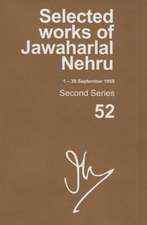Europe's New Nationalism: States and Minorities in Conflict
Editat de Richard Caplan, John Fefferen Limba Engleză Paperback – 16 ian 1997
Preț: 108.87 lei
Preț vechi: 139.35 lei
-22% Nou
Puncte Express: 163
Preț estimativ în valută:
20.83€ • 21.80$ • 17.31£
20.83€ • 21.80$ • 17.31£
Carte tipărită la comandă
Livrare economică 22-28 martie
Preluare comenzi: 021 569.72.76
Specificații
ISBN-13: 9780195091496
ISBN-10: 0195091493
Pagini: 256
Dimensiuni: 157 x 235 x 17 mm
Greutate: 0.36 kg
Ediția:New.
Editura: Oxford University Press
Colecția OUP USA
Locul publicării:New York, United States
ISBN-10: 0195091493
Pagini: 256
Dimensiuni: 157 x 235 x 17 mm
Greutate: 0.36 kg
Ediția:New.
Editura: Oxford University Press
Colecția OUP USA
Locul publicării:New York, United States
Recenzii
Part of the collection's strength is the varied national backgrounds of the contributors and this allows particular insight into the problems that they are analysing ... Alex Grigorievs on the Baltic predicament and Adam Michnik on the former Yugoslavia provide illuminating analysis.
An excellent collection of essays on a most timely subject - contributes significantly to an understanding of European politics beyond the traditional class analysis.
With nationalism re-emerging as a major force in Europe, this multidisciplinary, multinational collection of attempts to understand its impact on European politics represents a useful and welcome addition to the ongoing discussion.
Europe's New Nationalism examines the forces which have buffeted the continent since the end of the Cold War. Its thoughtful essays identify the roots of those forces in a period when on both sides of the old Iron Curtain there was a common illusion that nationalism was on its way out. Comprehensive and balanced in its treatment of both Eastern and Western Europe, and of majority and minority movements, it is an excellent guide to the difficult landscape of late twentieth century nationalism.
Ranging across Europe, from Georgia to Scotland, this impressive collection exposes the strikingly different nationalisms that have all too often been conflated into a single phenomenon. Building on recent theories of the nation, the articles interrogate nationalism's troubled relationship with empires and states, minorities and diasporas, liberalism and gender. No easy answers are given, but by grounding the questions in specific national experiences, the editors and authors give us essential guideposts to what lies ahead.
This book addresses what is becoming a familiar issue, but does it in an original and thought-provoking way. A strong and diverse set of contributors move us well beyond the cliches of ethnic conflict, putting nationalism in its full theoretical and historical context, addressing the challenge it poses to established western states as well as the new post-communist states of eastern Europe.
This collection of essays does indeed cover the principal currents of thinking about European nationalism ... outstanding quality of some of the individual contributions, which make this book resommendable reading.
An excellent collection of essays on a most timely subject - contributes significantly to an understanding of European politics beyond the traditional class analysis.
With nationalism re-emerging as a major force in Europe, this multidisciplinary, multinational collection of attempts to understand its impact on European politics represents a useful and welcome addition to the ongoing discussion.
Europe's New Nationalism examines the forces which have buffeted the continent since the end of the Cold War. Its thoughtful essays identify the roots of those forces in a period when on both sides of the old Iron Curtain there was a common illusion that nationalism was on its way out. Comprehensive and balanced in its treatment of both Eastern and Western Europe, and of majority and minority movements, it is an excellent guide to the difficult landscape of late twentieth century nationalism.
Ranging across Europe, from Georgia to Scotland, this impressive collection exposes the strikingly different nationalisms that have all too often been conflated into a single phenomenon. Building on recent theories of the nation, the articles interrogate nationalism's troubled relationship with empires and states, minorities and diasporas, liberalism and gender. No easy answers are given, but by grounding the questions in specific national experiences, the editors and authors give us essential guideposts to what lies ahead.
This book addresses what is becoming a familiar issue, but does it in an original and thought-provoking way. A strong and diverse set of contributors move us well beyond the cliches of ethnic conflict, putting nationalism in its full theoretical and historical context, addressing the challenge it poses to established western states as well as the new post-communist states of eastern Europe.
This collection of essays does indeed cover the principal currents of thinking about European nationalism ... outstanding quality of some of the individual contributions, which make this book resommendable reading.













